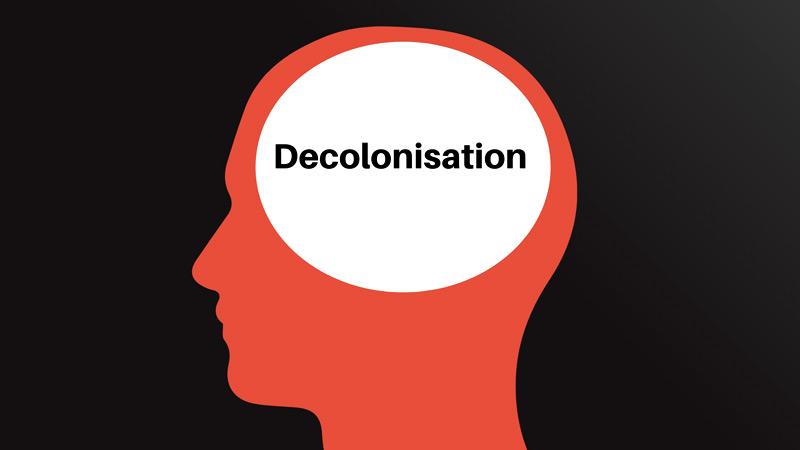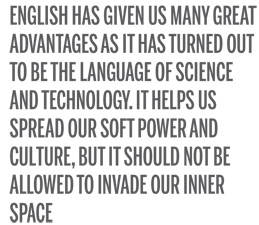
The end result of successful decolonisation may equate to a form of indigenous utopianism. Given the widespread nature of colonialism, neo-colonialism and cultural colonialism, the goal of full decolonisation may seem elusive. Mythical indigenous scholars said that an important aspect of decolonisation is the uplifting of indigenous knowledge.
 Recently one of the well-known publishers tweeted: “So, when Shakespeare was writing, who was writing in India or for that matter in Asia? She might have been teasing the twitterati. I replied that various Ramayanas were being composed in different languages in India. Had Britain not colonised half the world, Shakespeare would have remained a local bard in a cold island somewhere in the backwaters of Europe. I am a great admirer of Shakespeare, but I do not consider him the greatest writer who ever lived.”
Recently one of the well-known publishers tweeted: “So, when Shakespeare was writing, who was writing in India or for that matter in Asia? She might have been teasing the twitterati. I replied that various Ramayanas were being composed in different languages in India. Had Britain not colonised half the world, Shakespeare would have remained a local bard in a cold island somewhere in the backwaters of Europe. I am a great admirer of Shakespeare, but I do not consider him the greatest writer who ever lived.”
In my school, a teacher was hired to teach English. For most of the students, English was an alien language. The teachers were forced to teach even English in Tamil as it happens in most villages. It was not because teachers lacked the skills, but any other approach would have alienated the average student from studies. That year our school principal had decided to make the translated version of ‘Alai Osai,’ a Tamil novel written by Kalkyas an additional study material. The teacher was shocked to find that instead of Dickens or Jane Austen, she would be teaching a translated version of some local writer.
Idiosyncratic decision
She spent the major part of her teaching ranting indirectly against the idiosyncratic decision of the principal. We were happy when she stopped coming to the school. It gave us some free hours from a stifling language class. Much to our dismay, she returned after a week. Her opinion on local literature had undergone a sea change. She said Kalki’s novel was as good as many classical English novels. Though it sounded condescending, five decades back her wholesome praise on the native writer made us feel good. Perhaps, we were not savages as we were taught to believe.
We are still weighed down by the baggage of colonial rule in our school text books. We treat Kalidasa as the Shakespeare of India. Kalidasa, the Sanskrit dramatist and poet lived thousand years before Shakespeare. More people would have, perhaps, watched ‘Sakuntalam’ and ‘Romeo and Juliet’.
No doubt, ‘Romeo and Juliet’ is a wonderful play, but the plot, characterisation and climax had left me scratching my head in confusion.
The heroine drinks a potion that would put her into a coma for 48 hours. The hero does not know this, so he commits suicide.
The heroine wakes up and finds that her lover is dead. So, she also promptly commits suicide. To put it in a nutshell, it sounds pedestrian. It is the bard’s great language skills that elevate the story, but a story should make sense despite the language. Otherwise it becomes lyricism and not a story. Compare this with the characterisation and climax in ‘Shakuntalam’.
The story is more powerful in the original ‘Mahabharata’ version. The heroine is rejected by the hero, but she does not commit suicide. Instead she brings up his child as a single mother and is reunited with the remorse-filled father.
‘Bharata Desh’ (India) owes her name to the heroine’s son ‘Bharata.’ The stories of single mothers, whether it is Shakuntala or Sita of Ramayana who bestowed their greatest love on their lover or husband who had forsaken them by bringing up a son who could outdo his father appear more modern and life affirming than the heroines committing suicide.
Chilapathikaram
How many of our students learn at least a translated version of Kalidasa or Valmiki? How many students know about Ilango’s ‘Chilapathikaram’ or Kamban’s ‘Ramayana’? It would be difficult for a layman to read classical Sanskrit or Tamil. Can anyone today excel Kamban’s poetical work ‘The Kamba Ramayana’? A generation believes, if at all they have heard about him, that Chanakya who lived in the third century BC wrote ‘Artha Shastra’ and laid the foundation to the richest empire in the world.
Nicola Machiavelli was a part-time playwright and a minor Italian diplomat of a city called Florence in the 15th century Italy. Florence would have been the size of an average Indian wayside town in the medieval era. In his spare time, he wrote a book called ‘The Prince’ in which he said unscrupulousness was a norm of the ruler.
He never found an empire nor wrote a treatise on polity that influenced empires for the next 2000 years. Yet Chanakya is the Machiavelli of India and not the other way round. Samudragupta, the emperor who ruled an area six times that of France and who never lost a war is called India’s Napoleon. It is amusing and tragic.
English has given us many great advantages as it has turned out to be the language of science and technology. It helps us spread our soft power and culture, but it should not be allowed to invade our inner space.
For us, English is not a language but a tool for advancement. Like any tool, it has to be handled carefully. Looking back, colonies are dismantled, but our minds are still under the influence of our past masters. The sooner we get rid of this mindset the better for our future generations.
The writer is a freelance journalist and Indologist based in Hyderabad, India.
